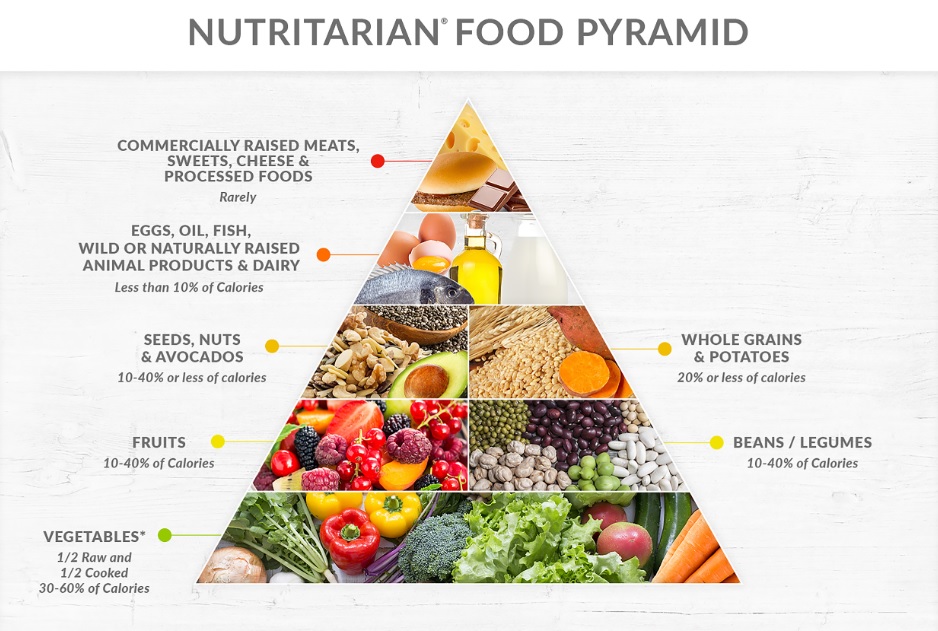The Nutritarian Diet, created by Dr. Joel Fuhrman, is a plant-based eating approach that emphasizes consuming nutrient-dense foods to promote optimal health and prevent chronic diseases. The focus of this diet is to maximize the intake of whole, plant-based foods while minimizing processed and animal-based products. In this article, we will delve into the principles, benefits, and key features of the Nutritarian Diet.
Principles of the Nutritarian Diet:
The Nutritarian Diet is based on the following principles:
- Nutrient density: The diet emphasizes consuming foods that are rich in nutrients per calorie. These include fruits, vegetables, whole grains, legumes, nuts, and seeds. These foods provide essential vitamins, minerals, Antioxidants, and phytochemicals that support overall health and well-being.
- Plant-based focus: The Nutritarian Diet revolves around a plant-based eating pattern. Plant foods form the foundation of the diet, while animal products and processed foods are limited or eliminated.
- Micronutrient diversity: The diet encourages a wide variety of plant foods to ensure a broad spectrum of nutrients. The goal is to consume a diverse range of fruits, vegetables, grains, and legumes to obtain a comprehensive array of vitamins, minerals, and other beneficial compounds.
- Minimization of processed foods and added sugars: The Nutritarian Diet discourages the consumption of processed foods, refined sugars, and artificial additives. These items tend to be low in nutrients and can have adverse effects on health.
Benefits of the Nutritarian Diet:
The Nutritarian Diet offers several potential benefits for overall health and well-being:
- Disease prevention: The diet’s emphasis on nutrient-dense plant foods has been associated with a reduced risk of chronic diseases such as heart disease, diabetes, certain cancers, and obesity.
- Weight management: The Nutritarian Diet promotes weight loss and weight management by focusing on low-calorie, high-nutrient foods that help control appetite and provide satiety.
- Increased nutrient intake: By prioritizing nutrient-dense foods, the diet ensures a higher intake of essential vitamins, minerals, and other beneficial compounds that support optimal health and function of the body.
- Improved gut health: The abundance of fiber and prebiotics in plant-based foods can promote a healthy gut microbiome, which is linked to improved digestion, immune function, and overall well-being.
Key Features of the Nutritarian Diet:
Here are some key features of the Nutritarian Diet:
- Focus on whole, plant-based foods: The diet encourages the consumption of a wide variety of fruits, vegetables, whole grains, legumes, nuts, and seeds. These foods form the basis of meals and should be consumed in large quantities.
- Limited animal products and processed foods: Animal products, especially red meat, are limited in the Nutritarian Diet. Processed foods, added sugars, and artificial additives are also minimized or avoided.
- Emphasis on raw and cooked vegetables: The diet promotes a combination of raw and cooked vegetables to maximize nutrient intake. Raw vegetables are rich in enzymes and certain nutrients, while cooked vegetables can enhance the availability of other nutrients.
- Nutrient-packed meals: The Nutritarian Diet encourages creating meals that are packed with nutrient-dense ingredients, with a focus on colorful vegetables, whole grains, legumes, and healthy fats from sources like nuts and seeds.

Dr. Fuhrman’s Nutritarian Pyramid Image Credit : https://www.drfuhrman.com
The Diet is a plant-based eating approach that prioritizes nutrient dense foods to support optimal health and prevent chronic diseases. By focusing on whole, plant-based foods and minimizing processed and animal-based products, individuals can increase their intake of essential nutrients while avoiding potentially harmful substances. The diet offers numerous potential benefits, including disease prevention, weight management, increased nutrient intake, and improved gut health. As with any diet, it’s important to consult with a healthcare professional before making significant changes to your eating habits, especially if you have any underlying health conditions. Remember, the Diet promotes a long-term approach to health and well-being by incorporating a variety of nutrient-rich foods into your daily meals.
